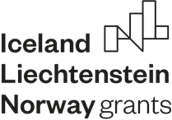2023-04-13


2023-04-12
BRAIN BATTLE
Public Health Office of Plungė District Municipality, 2023 on May 12, organizes a battle of students' minds "Be independent and responsible"
The purpose of the battle of minds is to educate a person who can think critically and creatively, to defend his opinion, as well as to introduce the harm caused by psychoactive substances and electronic cigarettes.
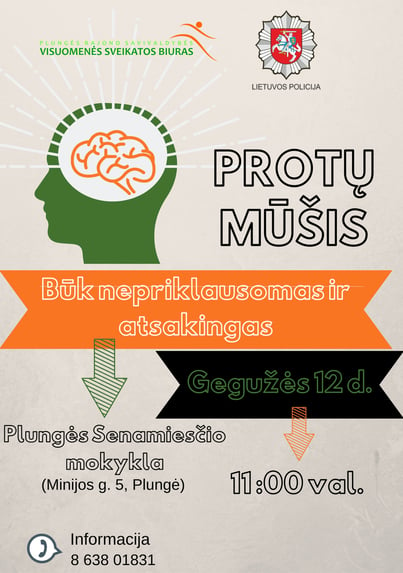

2023-04-10
Schoolchildren's spring vacation has begun. What are your plans - are you going to see your friends?
Friendship is an extraordinary experience full of discoveries that helps us grow, learn about the world, and reveal ourselves. When there are difficulties in life, we expect support, understanding, and presence from friends. When times are happier - then it's fun to share happy experiences and laugh together with a friend.
Being a friend can mean many different things to everyone.
What is friendship to you?
If you want to talk about friends, friendship, loneliness - call the Youth Coordinator at 8 673 34028 or contact us by e-mail. by mail koordinatorius@plungesvsb.lt
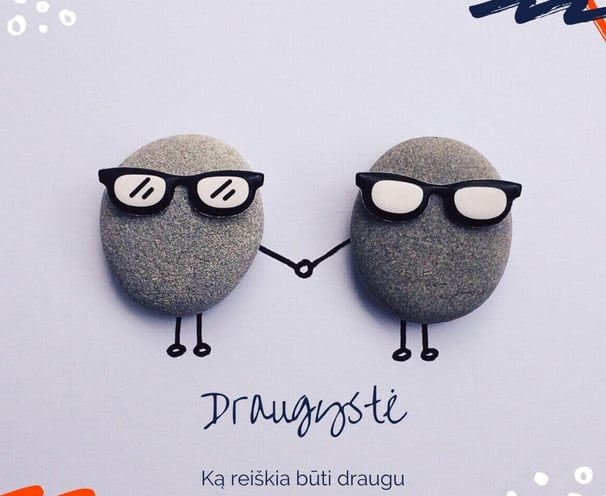

If you feel tense, nervous, tired;
feel an increased pulse and breathing;
shaking or sweating;
You have difficulty concentrating;
it's possible that you're feeling all of this for no apparent reason, it's likely that you're experiencing anxiety right now.
Read the prepared recommendations on how to stay calm and patient with anxiety.
And remember that right now your feelings don't have to be ideal. Let yourself feel.
If you face challenges, you can also contact Monika, coordinator of youth-friendly health care services, by phone +37067334028


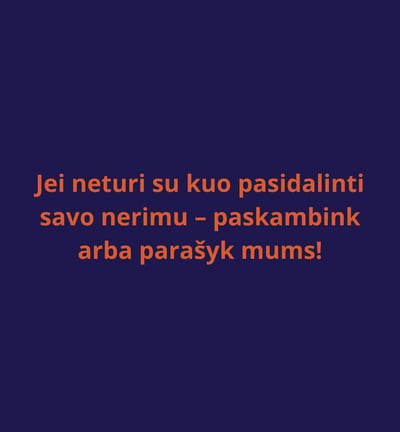

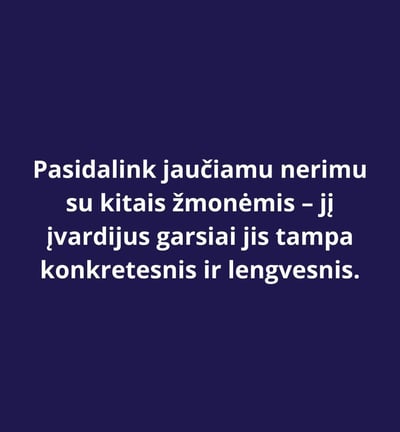

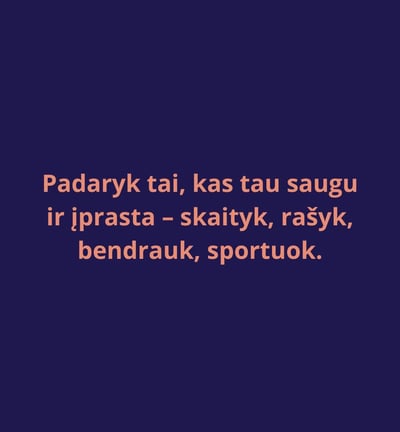

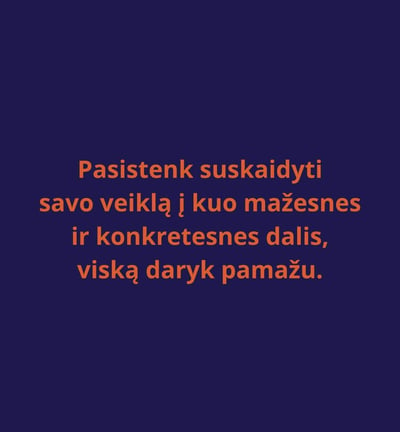

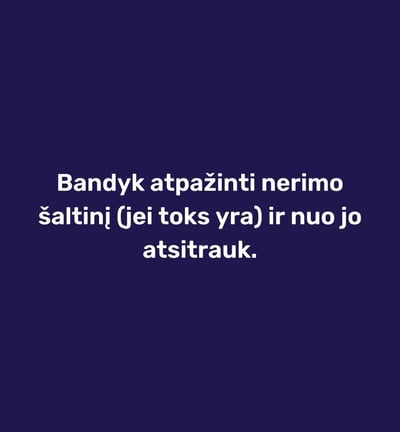

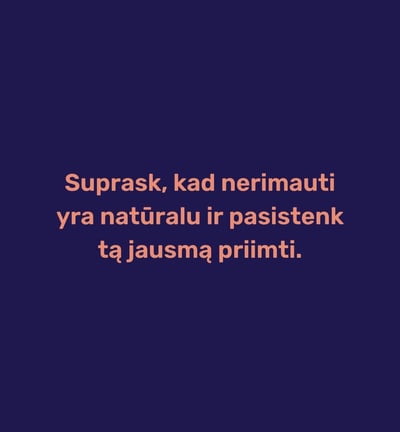

2022-03-08
Remote publicity event
As you already know, since 2021, the Plungė district municipality has been implementing a continuous project "Implementation of the youth-friendly health care services (JPSPP) model in the municipalities of Plungė, Mažeikiai and Tauragė districts". During this project, the youth of the Plungė district can apply or be directed to the JPSPP coordinator and receive individual consultations on issues of healthy lifestyle and changing habits.
We invite you to a remote publicity event that will take place in 2023. March 14 13.00-15.00 hours
This event is aimed at young people between 14 and 29 years old. Please share this invitation with everyone who might be interested in the event.
The project is financed from the funds of the EEA and Norwegian financial mechanisms.
Inform about your participation by e-mail. by mail: koordinatorius@plungesvsb.lt.
We will wait for you!
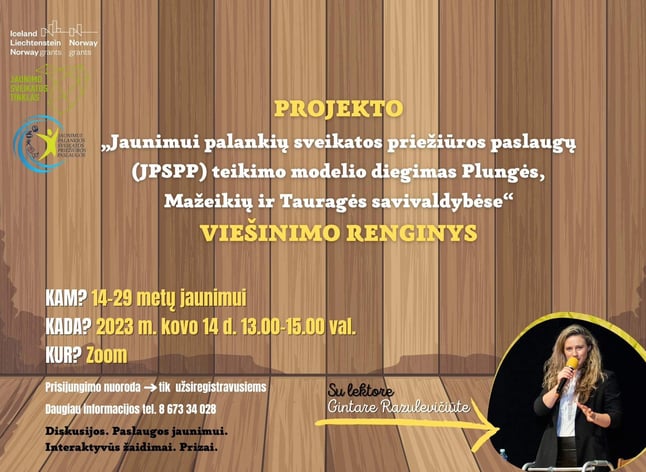

How can we help ourselves when we feel sad? Read the prepared recommendations.
If you see that you cannot deal with the feelings that have arisen on your own, call or write to Monika, the coordinator of youth-friendly health care services, on +37067334028
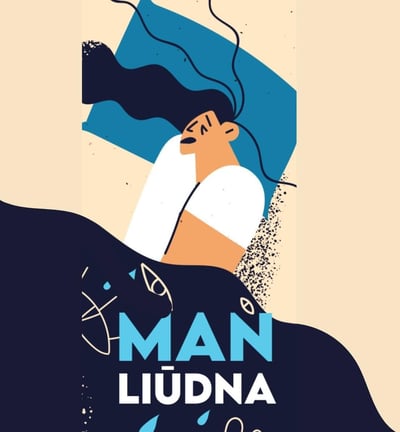







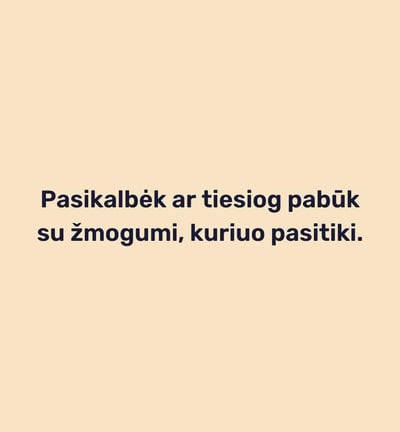



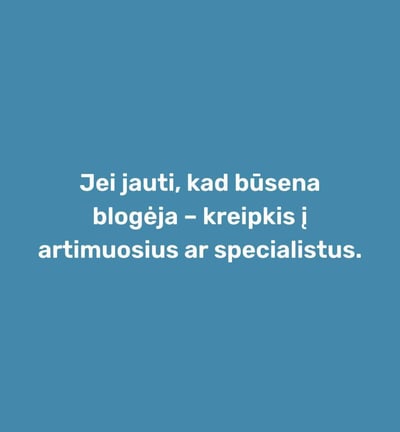

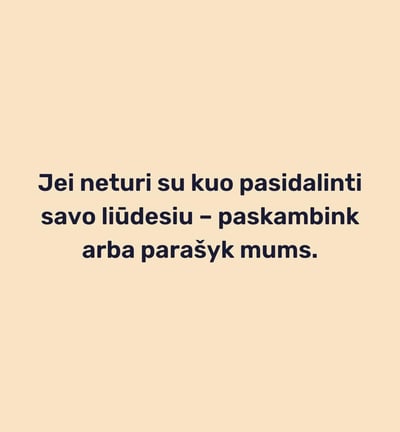

2023-01-12
2022-12-07
Are you a young person aged 14-29 and have problems you want to talk about? Let's get in touch
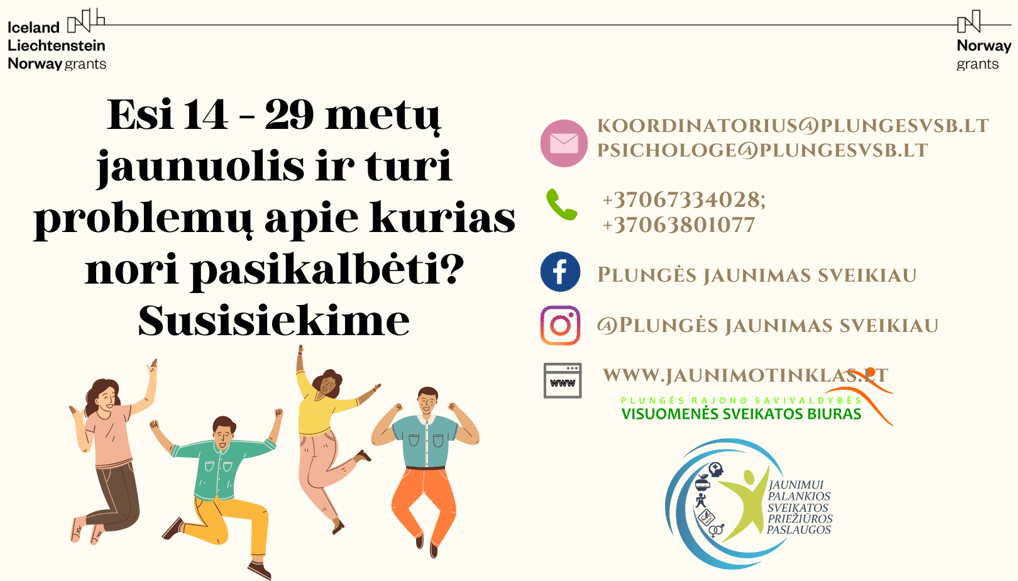

2022-11-21
A lecture on sexuality
On November 21, at the Babrungas secondary school in Plungė, JPSPP coordinator Monika Šakinė and psychologist Karolina Sragauskaitė of the Plungė district municipal public health office conducted training on sexuality for girls.
During the training, the girls were introduced to the influence of stereotypes and how to resist them. When young people hear a certain stereotype that dictates how a boy or girl should act or say something, they often unconsciously try to live it up. Stereotypes can also lead to harmful effects such as bullying and harassment based on gender, and can limit a person's ability to grow in various areas. Gender stereotypes can influence the decisions we make, the way we build relationships, and the way we look at each other. Also, that it can have an influence in the future, when some people decide to start a family - how we share our responsibilities, how we share work. Since children learn this stereotypical thinking from the environment that surrounds them (parents, teachers, toys, books, etc.), there must be sources of education that change and discourage this thinking. Thus, in order to ensure the comprehensive development of the child's brain, both boys and girls should have access to the same educational methods and opportunities.
During the lecture, healthy and toxic relationships were discussed. In order for a young person to be able to build healthy, respectful and supportive relationships with other people, he must first of all learn to build a relationship (filled with love, listening, sensitivity and responsibility) with himself. Healthy relationships can only be created by healthy, wholesome and conscious people. i.e., if a person does not have a good relationship with himself, is not able to respect and love himself and his body, he will not be able to cultivate a relationship based on love and respect with others. Toxic relationships, in principle, are characterized by the opposite features of healthy relationships: in such relationships, a person does not feel safe, does not feel understood, his boundaries are not respected, etc.
When it comes to relationships, showing attention and acceptance, the girls were first talked about boundaries, because this is the basis that will determine how a person will "navigate" in a relationship, whether they will be able to resist pressure, whether they will be able to recognize and resist unwanted behavior or seek consent and respect others human limits. A young person must also understand that clear communication is necessary in any relationship - if a person is able to say "Yes" and "No" clearly, he can not only protect himself, but also provide security, reliability and clarity to the other person. After all, clear communication is the basis of healthy relationships.
During the training, protective measures and sexually transmitted diseases were discussed, as well as how to distinguish harassment from a filter. The girls were introduced to the possibilities of help in the face of traumatic experiences (misbehavior), gender identity issues. It was discussed that we all have the right to say "no", that we need to talk and be heard, critically evaluate situations, hygiene, a safe environment, and the consent of the other person are very important.
Myths and facts about sexuality are discussed at the end of the lecture.
What to do if you experience unpleasant touches:
STEP 1: Say no, stop, don't like, don't want
STEP 2: physically remove yourself from the dangerous situation, if you fail - scream or otherwise call for help.
STEP 3: Tell a trusted adult about what happened.
And if you also have questions or want to know more about sexuality, you can always contact the JPSPP coordinator for a consultation.
Contact:
+37067334028
JPSPP coordinator Monika Šakinė
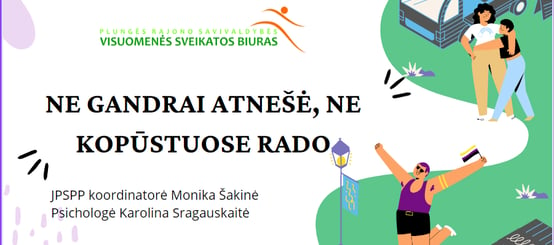

2022-11-18
Inter-institutional cooperation training
November 18 The public health office of the Plungė district municipality conducted inter-institutional cooperation training for all project partners in the Plungė open youth center of the project "Implementation of the youth-friendly health care services (JPSPP) model in the municipalities of Plungė, Mažeikiai and Tauragė districts".
It's great when different institutions in the entire Plunge district can cooperate so smoothly in order to improve the physical and emotional health of young people. Social workers, case managers, employees of non-governmental organizations, representatives of health care institutions, law enforcement and the municipality gathered to discuss the possibilities of a youth-friendly health care service model in inter-institutional cooperation training.
The public health office of the Plungė district municipality believes that work results depend on strong partners, so during the training, thanks were given for close cooperation. Together with the new JPSPP coordinator, Monika Šakine, the work done and the goal set were discussed - to unite different service-providing institutions and improve their cooperation by providing more effective health care services adapted to young people, thereby ensuring the reduction of health inequalities and helping young people to cope with problems quickly and efficiently.
During this project, the youth of the Plungė district can apply or be directed to the JPSPP coordinator and receive individual consultations on healthy lifestyle, changing habits, if necessary, receive free psychological consultations or health care services on the basis of the "green corridor". "Green Corridor" is an established procedure according to which a young person gains priority to receive a doctor's consultation sooner than usual. If necessary, the young person is referred to project partners providing assistance (social workers, health care institutions, non-governmental organizations, career specialists, etc.).
During the training, we talked about reducing the use of psychoactive substances among young people, sexual violence, ways to recognize it and get help, about youth sexuality education, toxic adolescent relationships, practical implementation of constructive communication techniques, and active teaching methods adapted to youth groups. During these trainings, the project partners shared their experience in working with problem youth and insights into the role of institutions in solving youth problems.
We hope that after these trainings, relations with project partners will strengthen and inter-institutional cooperation will improve!
JPSPP coordinator Monika Šakinė
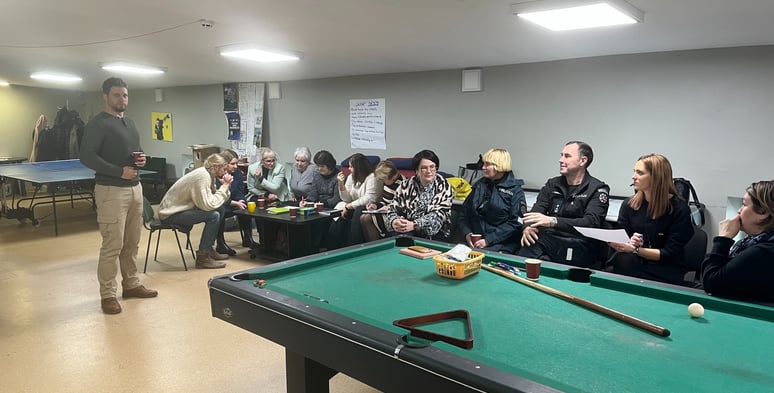

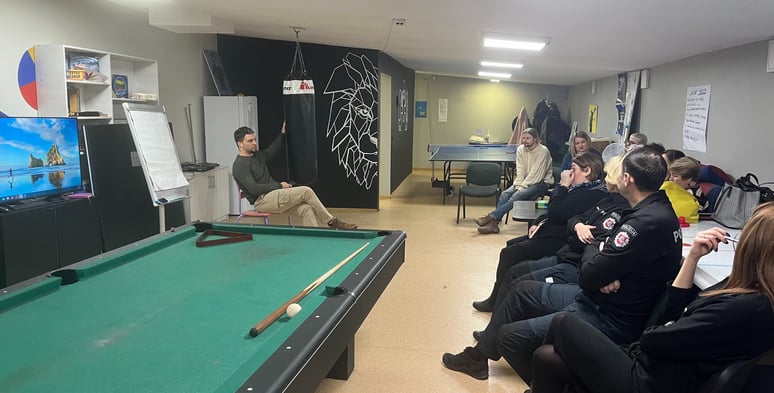

2022-10-14
Prevention of eating disorders
On October 14, lecturer Julija Morozovaitė gave training to young people about the prevention of eating disorders at Plungė Old Town School.
During the training, the lecturer introduced the youth to the fact that eating disorders are manifested by excessive attention to one's weight, body shape and food and lead to the development of harmful eating habits and insufficient nutrition. Anorexia nervosa, bulimia nervosa and overeating are common. Eating disorders eventually damage the heart, digestive system, bones, teeth and mouth and lead to a number of other illnesses or even death.
What if I think I have an eating disorder?
Treating eating disorders is not very easy. Even when you are clearly aware that you need to change your eating habits, it can be difficult to do so. The most important thing is to discover the causes of such a disorder. A psychologist or psychotherapist can help with this. The first step to recovery is admitting you have a problem and seeking professional help. This can be a very difficult step, but it is extremely important.
How do I recognize that my loved one has an eating disorder?
Eating disorders are not hard to spot because they usually come on suddenly. A person begins to avoid eating in front of you, follows very drastic diets, or there are sudden changes in nutrition that are clearly reflected in his appearance, well-being and emotions. Frequent trips to the toilet after meals or excessive exercise can be observed. In such a case, you should talk to your loved one, do not put too much pressure on him, but show him that you can become a pillar for him, that he can confidently talk about what is happening in his life and what troubles have befallen him. If the loved one admits to having an eating disorder after the interview, offer to seek help and support throughout the healing process.
And if you also want to know about the damage of eating disorders to our body or feel that you have an eating disorder, you can always contact the JPSPP coordinator for a consultation. Treating eating disorders is usually a difficult and long process. Therefore, the help of a specialist is necessary. The JPSPP coordinator will help you discover what started these disorders. You can try several methods yourself: food diary, food planning, following a regime. The most important thing is to admit to yourself that this is a problem and understand that you can always ask for help when you are no longer able to solve it on your own.
Contact:
+37067334028
JPSPP coordinator Monika Šakinė
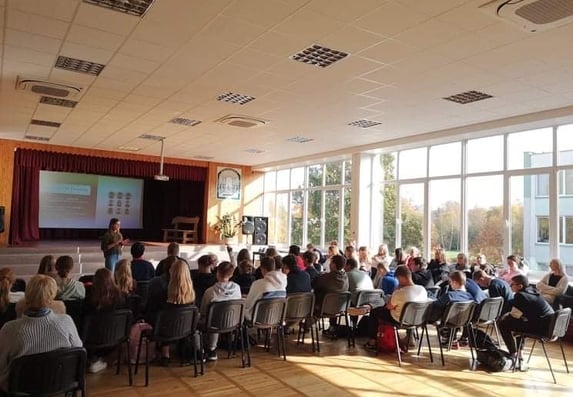

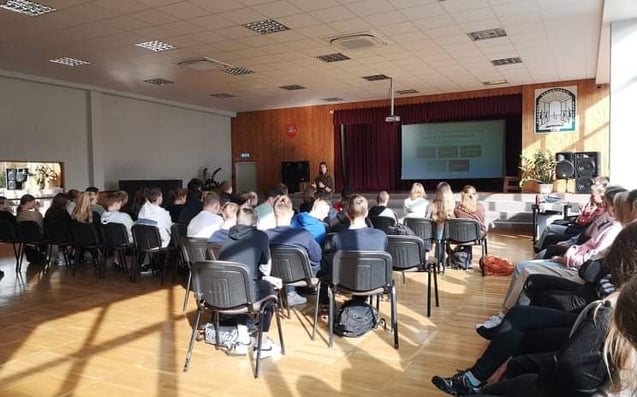

2022-10-10
October 10 World Mental Health Day was celebrated at Plungė "Saulė" gymnasium
This day is another reminder, call and opportunity for all of us to look into mental health issues and reach out to those who need our help the most. Our mental health is directly related to our quality of life. This is a feeling of well-being, a stable emotional and spiritual state that allows a person to enjoy his life.
Sh. m. October 11 JPSPP coordinator Monika Šakinė visited the Plungė "Saulė" gymnasium, who introduced the youth to the impact of emotions on our body. During the lecture, it was discussed that there are no good or bad emotions, they are all useful and necessary for a person. It is important to be able to recognize your emotions and express them properly. Mental health is the ability to be oneself among others, an emotional and spiritual state that allows a person to enjoy the fullness of life, as well as to experience pain and sadness, the ability to express oneself in ways that bring pleasure to oneself and others, the ability to make one's own decisions and be responsible for them .
After the lecture, the young people took part in a brainstorming session organized by JPSPP coordinator Monika Šakinė - the winners of the first, second and third places were awarded prizes established by the Public Health Office of the Plungė District Municipality.
A practical task was also completed, during which each young person inflated a balloon and drew their emotions on it in order to evaluate and discuss how they feel today.
“Nothing strengthens and nothing weakens like emotions.” (Joseph Roux)
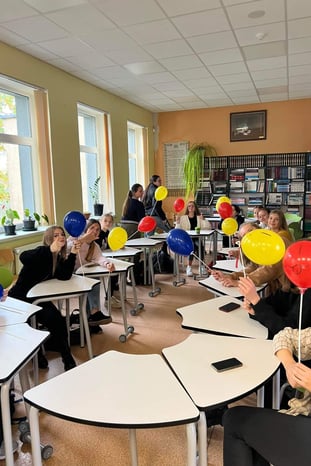

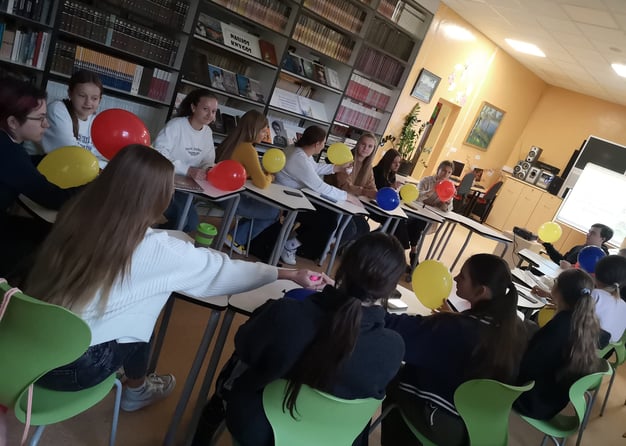

2022-10-12
Problematic internet training in Klaipėda
Monika Šakinė, coordinator of the JPSPP of the Public Health Office of the Plungė District Municipality, participated in the training of the Digital Ethics Center "Challenges of Problematic Internet Use (PIN) and the use of other technologies for mental health: help for a specialist".
The aim of the event was to discuss the challenges of PIN for human mental and physical health and for society as a whole and to find solutions to the problems caused by the relationship with the digital world.
During the training, it was discussed that recently there is more and more talk about Internet addiction, when a person is involved in electronic entertainment in such a way that the physical environment becomes completely unimportant to him. During the training, the lecturers explained that the corporations ruling the digital world set traps for people with their technological solutions. There is no way for users who fall into them to suppress their urge to surf. And for companies, human attention is now as valuable as oil, because their goal, after all, is to make money. This is done precisely in the time we spend online.
Not everyone who spends a lot of time online is actually addicted to it. As the lecturers explained, frequent use of the Internet in itself is not necessarily a problem. If we surf the Internet, talk on social networks, look for some kind of information, but in principle this does not interfere with our daily functioning, work, education, communication with family, then it can be considered that this is a variant of the norm. But it is very important how much time we actually spend online. One of the most important levers for recognizing when a person is truly addicted to the Internet is whether the Internet is interfering with their normal activities and socializing in real life. If the amount of time you spend surfing the Internet, social networks or, even more so, pornography websites will be so much that you will not go to work in the morning, you will not go to lectures, your relationships with close people will be disturbed, then we can talk about a clear addiction that should be addressed.
According to the lecturers, as with all behavioral addictions, the most effective way to break free from this trap is to control your impulses. To achieve this, it is necessary to follow a routine and set specific goals, what a person has to do during the day.
The known harms of PIN include the development of mental disorders, and young people are a particularly vulnerable group because the cognitive, academic and social impairments are long-lasting.
Early intervention and prevention options offer hope for reducing harm to health and society.
Perhaps the most important and interesting message of the professor is that the motivation to escape from difficulties in real life often leads to problematic behavior on the Internet, and not the feeling of satisfaction caused by that activity. As a result, professionals should pay attention to the fact that not only the time spent on the Internet, but also the purpose of using the Internet can be important for the development of addiction.
Dr. In a report prepared by Julius Burkauskas, he emphasized that PIN is a broad term that includes various forms of Internet use, such as excessive gaming, watching pornography, shopping, watching video content, using social networks, etc. As a result of PIN, young people may experience functional difficulties, lower grades, disrupt the learning process, and manifest psychopathological symptoms. Parents and other adults are the most important role models and supports for children and young people facing the challenges of the digital world. This is an area where there are no unequivocal answers, what matters is how much, for what purpose and under what circumstances screens are used. The amount of time children spend in front of the screen is important, but so is the content.
During the discussion, we unanimously agreed that entities receiving economic benefits from Internet products and services must commit and cooperate in creating a safe environment for users. Problematic Internet use is broad not only in definition, but also in responsibilities: from personal responsibility to decisions made at the state level. You are not a warrior in the field - in case of any kind of addiction, help is needed from various sides, we must act together, we can only help by cooperating. It is especially important to identify problems early and provide support with a special focus on children. The responsibility of adults is important - we, the adults, have to do certain things, after all, a preschooler does not have to decide for himself whether to go to sleep. It is very important to recognize the symptoms of problematic use and help young people experiencing them.
JPSPP coordinator Monika Šakinė
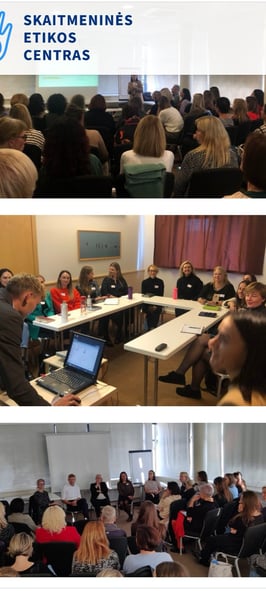

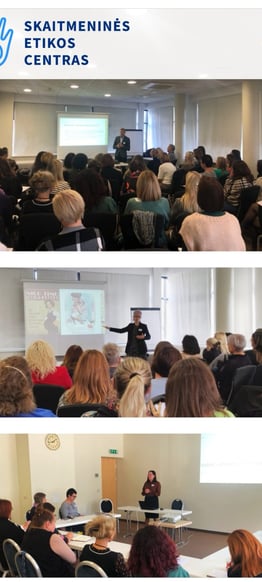

2022-10-07
Prevention of alcohol consumption
On October 7, lecturer Gintarė Razulevičiūtė conducted training for young people on the prevention of alcohol consumption.
We thank Gintare for sharing specific and very useful information, professionalism and sincerity during the event.
Here is a moment from the meeting of students of "Saulės" Gymnasium School! Thanks to everyone who participated!
And if you also want to learn more about the harm of alcohol to our body or feel that you have addictions, you can always contact the JPSPP coordinator and consult.
Contact:
+37067334028
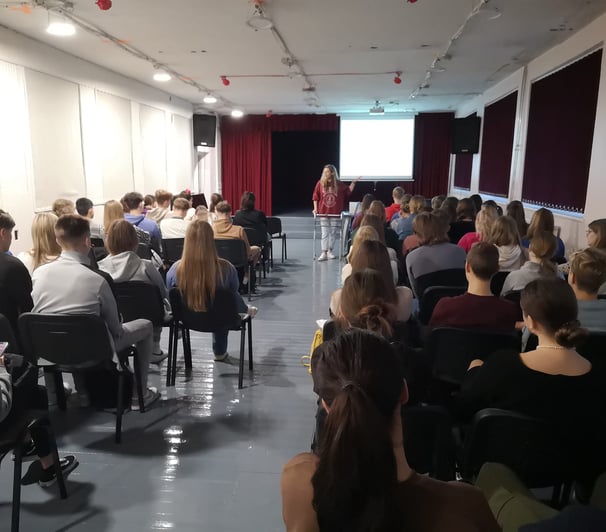

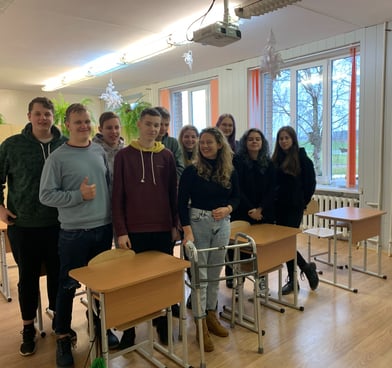

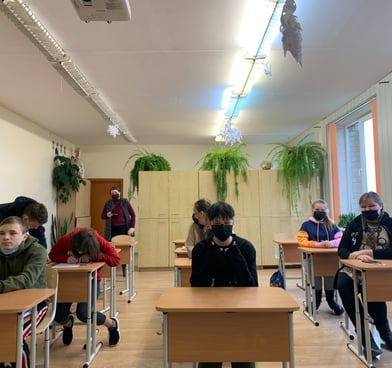

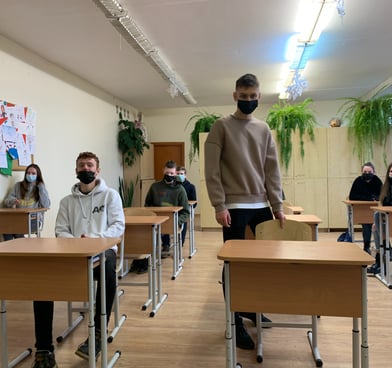

Moments from the training in Plungė:"Algorithm for Psychoactive and Alcohol Prevention"
2022-01-28
